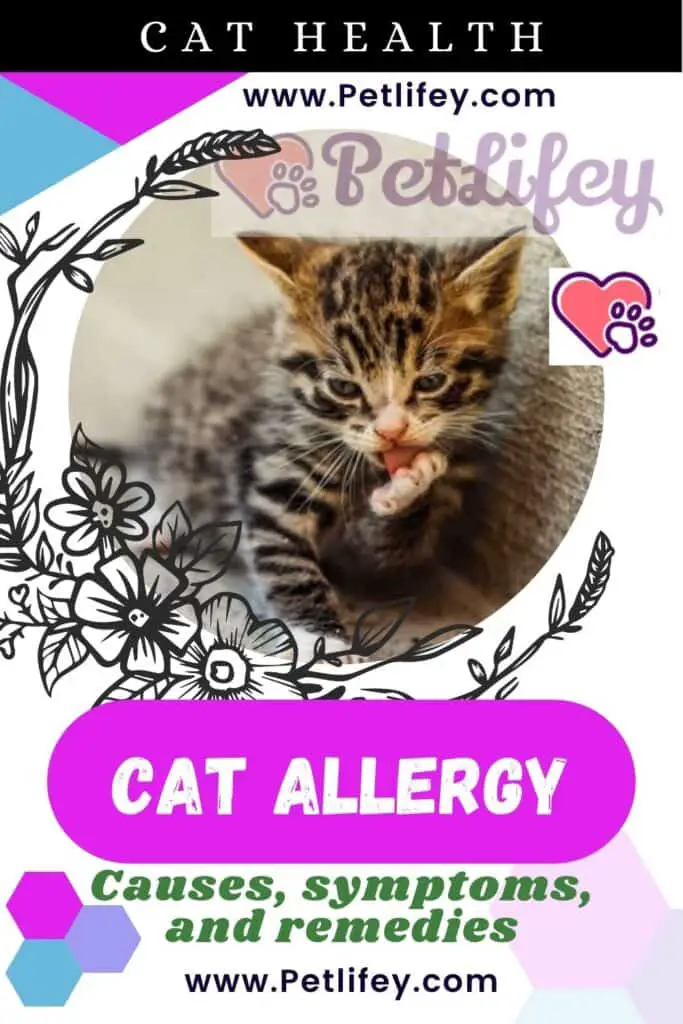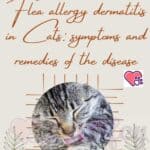
The cat allergies are more common than people think. Next, we will explain what they consist of, what are the causes, the symptoms, what you can do to combat them.
Allergy and cats
In fact, allergies produced by cats are usually twice as common compared to those produced by dogs.
It can also happen that the symptoms appear over time and you are not just starting to live with a cat.
In other words, the immune system develops this rejection of the allergen over time.
For this reason, it can happen that you start to have constant sneezing, watery eyes and itchy nose among other symptoms. And do not understand why or what is the cause.
What are allergies?
The Allergies are an overreaction and disproportionate elements that are considered by the body as foreign “allergens” generating a defence response of the immune system.
Causes of cat allergy
A recent investigation carried out by the University of Cambridge in the United Kingdom, about the causes of allergies to cats, suggested that an environmental toxin of bacterial origin.
This could be the main cause of triggering with greater intensity an immune response of the organism to the protein that is present in the saliva and hair of cats and that affects around 30% of the population.
Well, the study found that when the Fel D1 protein, present in the saliva, skin and sebaceous glands of felines, comes into contact with the body in the presence of an environmental bacterial toxin (lipopolysaccharides), the allergic response occurred with greater intensity .
They were also able to identify the part of the immune system that recognizes them, the TLR4 receptors and that activates the subsequent allergic reaction.
The final key has been that by inhibiting the response of this receptor with drugs, they have been able to block the effects of the protein and therefore, that the allergic reaction did not occur in this case.
Therefore we have one more actor at stake that until now was not considered for this type of allergies and in which its presence influences a lot.
This study could help a large number of people who are allergic to feline protein in the future . Are you one of them?
Symptoms of cat allergies
The symptoms that cats suffer from allergies are from sneezing, red and itchy eyes, irritated skin where the cat has previously touched you, mucus, nasal congestion, conjunctivitis, asthma or even skin rashes, dermatitis and hives.
The symptom can appear or manifest itself both immediately when there is contact with a cat or it can also manifest itself after a few minutes and in some people a couple of hours.
Cats that do not give allergies or hypoallergens
Allergies to cats, as mentioned above, occur due to the rejection of the Fel D1 protein by the immune system, since it was shown that this protein is responsible for allergies in 80% of cases.
Which is produced by the body of cats. This protein is found in its skin and saliva, for this reason a person allergic to cats will trigger several of the symptoms if a feline approaches, touches or licks its skin.
We must clarify that the Fel D1 protein is produced by all cats, as it is a genetic issue. However, there are cats that produce it in much less quantity than others. The so-called Hypoallergenic cats.
There is usually the wrong paradigm that believes that allergies to cats are caused by the animal’s hair. But this is not the case, as the allergen is present is on your skin.
For this reason, many people make the mistake of buying or adopting a Sphinx kitten or other breeds of hairless cats, believing that they will not cause allergic reactions and on the contrary, it may be worse.
Well, since there is no hair, the cat’s skin has direct contact with the skin of the person who adopts it. Causing allergic reactions.
The Siberian Cat and allergies
When talking about Hypoallergenic cats, we are referring specifically to the Siberian Cat. Well, there have been studies that show that they produce the allergenic protein Fel D1 in much less quantity than other cats. This breed of cats is particularly beautiful, they are medium in size and have a nice long mane.
Cat allergy vaccine
In 2011, a group of researchers led by immunologist Mark Larché released the formula for a vaccine against allergy to cats, which they had been working on for 10 years. They tested by taking samples of the Fel D1 protein along with blood samples from more than 100 people with cat allergies. In this way they discovered the parts of the protein that activated the immune cells or the body’s defences.
This vaccine is given in small doses, and between 4 and 8 doses may be needed during a year. This depending on the reaction of each patient.
Tips to prevent allergic reactions to cats

For all cat lovers the presence of their cat children in their lives is very important.
Due to this, when they develop allergic attacks themselves or a member of the family, the situation becomes a serious problem.
For this reason at petlifey we want to give you some tips that can help prevent allergic reactions that cats produce.
investigation, where tests will be carried out with a greater number of allergy sufferers compared to the initial investigation.
- Take care of your cat’s hygiene. You must be aware of cleaning it regularly. Combing it to remove excess dead hair and cleaning their body with special wet wipes for them in order to remove dirt and also reduce the accumulation of the protein secreted by their skin.
- Avoid the entrance of your cat to your room and especially get on the bed.
- Improve the cleanliness of your house, vacuuming furniture, sofas, carpets and above all maintaining the cleanliness of the areas where your cat travels the most, as well as in its litter box, toys and other utensils. In case the allergy is the same person who cleans, we recommend doing it using a mask.
- You can use some antihistamines used to decrease allergy symptoms. And also nasal decongestants. However, we recommend that you consult your GP or allergist.
- Apply Vetriderm, a spray from Bayer pharmaceuticals that you can apply on your cat. Which helps to inhibit allergens. But it is better to check with your vet first.
- You can also try some natural remedies that can work as antiseptics or can help reduce itchy skin such as Eucalyptus, flax seeds, alfalfa, apple cider vinegar, aloe vera and oats.
This information is indicative and never optional. If you have any questions or queries, consult your veterinarian or family doctor, who will be the one who can best advise you on this issue.
It is important to look for all possible alternatives to solve the problems caused by the allergies produced by your cat, as this situation can harm coexistence at home. For this reason we hope that the article has been useful to you and our advice can help you.






